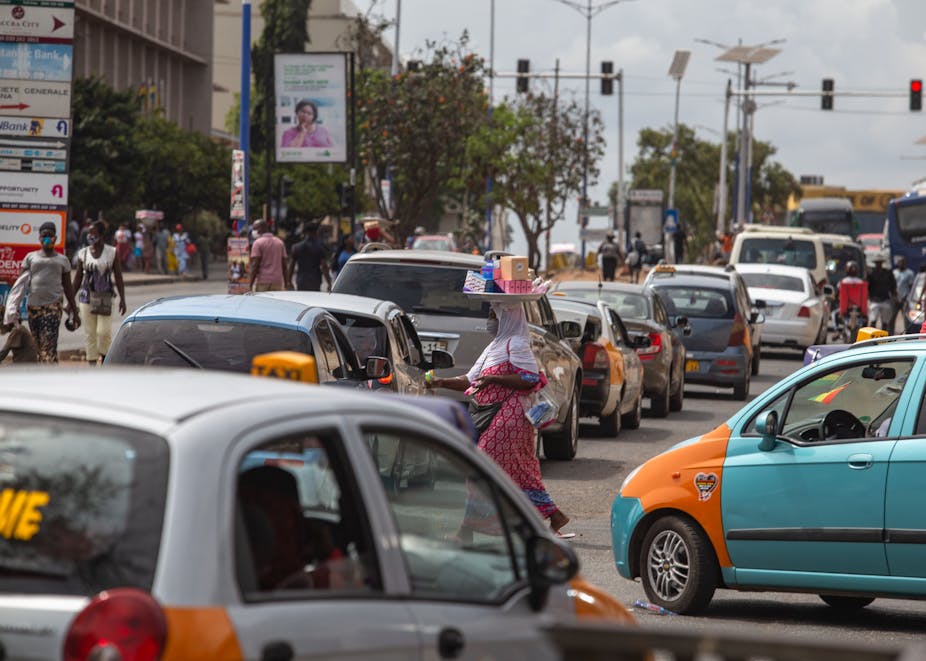Greenhouse gas emissions from transportation contribute to climate change. Nipah Dennis/AFP via Getty Images
Ghana has introduced some climate change policies and general environmental regulations but has yet to pass a Climate Change Act. This leaves the country without effective legal and regulatory instruments for addressing climate change. Climate change law expert Kikelomo Kila sets out her findings in a recent paper on why Ghana must not follow the “command and control” regulatory approach.
Why hasn’t Ghana introduced specific climate change legislation, and why is such legislation important?
Ghana relies instead on two legislative approaches. The first uses generic environmental legislation to govern climate change issues. The second uses policy instruments.
Under the first approach, Ghana mostly relies on the Environmental Protection Agency Act (1994) to regulate climate change matters. The act established the Environmental Protection Agency, and provides for its functions. These include making environmental policy and prescribing standards and guidelines. Other statutes that indirectly reference climate change issues include the Renewable Energy Act (2011) Act 832 and the Petroleum Production and Exploration Act (2016) Act 919.
The problem with this approach is that climate change impacts are secondary to issues like land use and conservation.
The second approach is to follow the 2013 National Climate Change Policy. This lacks any binding force on governmental bodies, corporations or individuals.
Climate change legislation is important because it specifically prescribes binding obligations and provides tools for action.
How effective have climate change laws been in African countries that have introduced them?
Climate change laws have been enacted in six African countries. These are Kenya, Benin Republic, Nigeria, Uganda, Mauritius, and South Africa. Most are still relatively new (between 2016 and 2023).
It will take time for the practical impacts to be felt, but there has been remarkable progress in some countries.
Take Kenya for instance. A World Bank 2021 report and the Kenya government’s report show improvement in Kenya’s climate mitigation and adaptation projects beginning from around 2018. Around 800,000 households benefited in 2022 from climate change funds. Climate proof coastal infrastructure has been put in place at the Mombasa port. Most counties in the country have passed their own climate laws. Foreign private sector actors invested about US$643 million) in climate-related capital in Kenya in 2021.
Similarly, Nigeria has witnessed a major shift since the enactment of its Climate Change Act 2021. It sets a target of achieving net zero greenhouse gases emissions between 2050 and 2070. This is significant given Nigeria’s status as a major oil exporter with significant carbon emissions from oil and gas production activities. The country’s climate change regulator, the National Council on Climate Change, instituted programmes and policies for key emissions sectors. It also introduced carbon market regulatory guidance for corporations seeking to invest in mitigation and adaptation projects in Nigeria. There is also a carbon pricing initiative for an emissions trading scheme.
Your research paper recommends that Ghana follow an alternative approach to climate change regulation.
This approach tackles the corporate culture of resisting regulation. Corporations in Africa have over decades developed a culture of disregarding regulatory measures.
The Dilute Interventionism approach is a framework designed for developing countries with weak regulatory systems. It gives corporations incentives to participate in regulatory systems which minimise their carbon emissions and promote mitigation projects.
It involves using strong legal instruments with stringent prescriptive measures as a starting point to ensure compliance with regulatory standards. As compliance increases, interventions are de-escalated. The state and regulatory bodies work together with corporations in this approach, to achieve better compliance. This “rewards” corporations for their compliance by allowing them to self-regulate when they have met a satisfactory standard.
This approach worked in Nigeria’s banking sector in 2006. Nigeria’s Central Bank adopted a series of regulatory measures (from tough to easier) after the banks had developed a culture of regulatory resistance for over two decades. The result was a significantly improved and reliable banking sector. The banks mostly self-regulate their activities alongside the Central Bank’s prescriptive regulation.
The closest to using this model in climate change is the Kenyan experience. The government introduced the Climate Change Act 2016 and the Climate Change (Amendment) Act 2023 which combine prescriptive and economic tools. These created incentives for corporate participation in climate change mitigation – and the approach has led to improvements.
You also caution that this approach will only succeed on three conditions: political will, technical capacity, and corporate compliance. Why these three, and does Ghana have these conditions in place?
Political will is vital to establishing a strong climate change regulator with statutory powers to institute the framework. Its effectiveness in monitoring and enforcement depends on availability of technical expertise.
Corporate compliance is key to smooth implementation of the measures. This is important as friction between corporations and the regulator may result in litigation that will slow down its implementation.
Ghana is currently lacking all three. There is not yet the political will to establish a strong climate change regulator. There is no technical capacity either, but this can be solved by outsourcing it to private entities under the supervision of the regulator. This exists in some other sectors.
Corporate compliance is also lacking, but this may come once the other two conditions are solved.![]()
Kikelomo Kila, Lecturer in Law, University of Huddersfield
This article is republished from The Conversation under a Creative Commons license. Read the original article.


